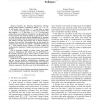Free Online Productivity Tools
i2Speak
i2Symbol
i2OCR
iTex2Img
iWeb2Print
iWeb2Shot
i2Type
iPdf2Split
iPdf2Merge
i2Bopomofo
i2Arabic
i2Style
i2Image
i2PDF
iLatex2Rtf
Sci2ools
COCO
2009
Springer
2009
Springer
New Results in the Simultaneous Message Passing Model via Information Theoretic Techniques
—Consider the following Simultaneous Message Passing (SMP) model for computing a relation f ⊆ X ×Y ×Z. In this model Alice, on input x ∈ X and Bob, on input y ∈ Y, send one message each to a third party Referee who then outputs a z ∈ Z such that (x, y, z) ∈ f. We first show optimal Direct sum results for all relations f in this model, both in the quantum and classical settings, in the situation where we allow shared resources (shared entanglement in quantum protocols and public coins in classical protocols) between Alice and Referee and Bob and Referee and no shared resource between Alice and Bob. This implies that, in this model, the communication required to compute k simultaneous instances of f, with constant success overall, is at least k-times the communication required to compute one instance with constant success. This in particular implies an earlier Direct sum result, shown by Chakrabarti, Shi, Wirth and Yao [CSWY01] for the Equality function (and a class of oth...
Related Content
| Added | 26 May 2010 |
| Updated | 26 May 2010 |
| Type | Conference |
| Year | 2009 |
| Where | COCO |
| Authors | Rahul Jain, Hartmut Klauck |
Comments (0)

